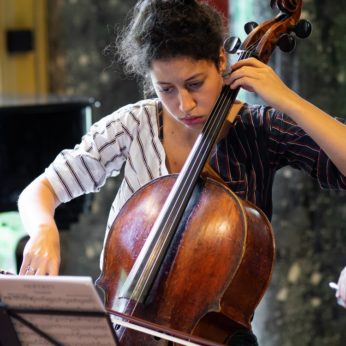Composer: Einojuhani Rautavaara (b. 1928 - d. 2016)
Performance date: 06/07/2018
Venue: Bantry Library
Composition Year: 1997
Duration: 00:27:56
Recording Engineer: Tom Norton, RTÉ
Instrumentation: 2vn, va, vc
Instrumentation Category:String Quintet
Artists:
Elina Vähäla -
[violin]
Mairead Hickey -
[violin]
Dana Zemtsov -
[viola]
Christopher Marwood -
[cello]
Ella van Poucke -
[cello]

The
composer himself wrote amusingly about the genesis of this piece. He was
commissioned by the Kuhmo Festival to write a string quartet for the summer of
1997 – but the work seemed to acquire a
will of its own; it wanted two cellos, clearly demanding a second cello – so I
could only agree with Thomas Mann when he said: it is difficult not to believe
that the work has a metaphysical mind of its own. After Schubert, there are
precious few two-cello quintets by major composers – the Festival hosted a new one
by Julia Wolfe just last year – so it is exciting to find another one. Although
this Quintet is over twenty years old, we think this is its Irish premiere.
The
subtitle is the composer’s, taken from a poem by Arthur Rimbaud that he had set
for male choir some twenty years earlier. The motif from that song appears in
the second bar of the first movement, where
the second violin answers the question posed by the first. The motif
reappears in all four movements and is taken up by each of the instruments. The
Quintet is in four movements, unhelpfully named I, II, III, IV, with no
traditional tempo indications. The texture is flowing with very few fast tempi,
the slow movements are especially beautiful though perhaps lacking in romantic
passion.
It is a curiously elusive
work. There is only one recording made by the Jean Sibelius Quartet and
Jan-Erik Gustafsson after the Festival in 1997 and the music is hard to locate.
Performances are difficult to find except perhaps in Finland and Quartets are
reluctant to take on unusual quintets so we should be grateful to today’s
performers for giving us a rare opportunity to hear this work in concert.
Copyright © 2025 West Cork Music. All rights reserved.
Designed and developed by Matrix Internet